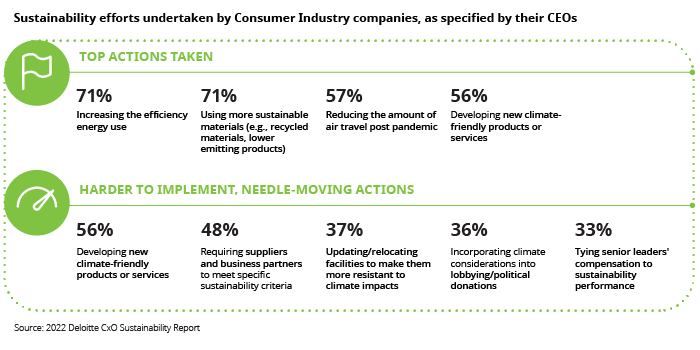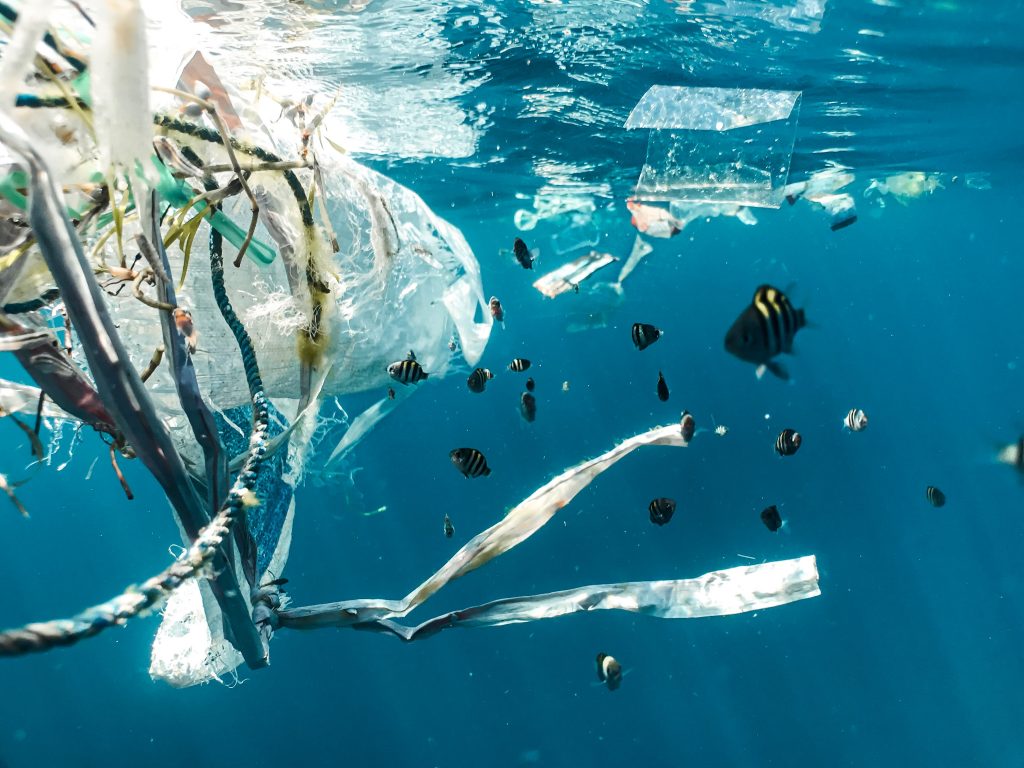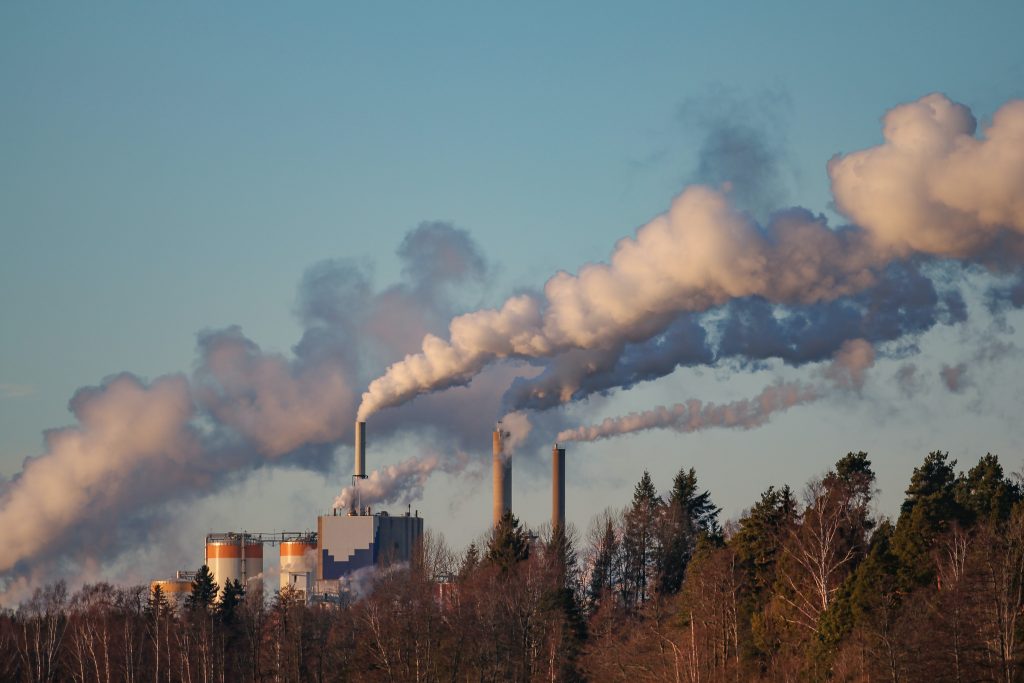Reflecting on the many positive messages shared throughout this World Earth Month, we look at trends that unite both global organizations and consumers in creating a better future for our planet. Whilst education is crucial across all sectors of our economy, we all have very specific roles to play in promoting sustainable practices.
According to a recent Deloitte report, 55% consumers surveyed globally had purchased a sustainable product or service in the previous four weeks. 32% also said they had paid significantly more for this purchase than a less sustainable alternative and were willing to wait longer for it. The majority of these purchases had been in the food and beverage sector, at 42%, followed by household goods at 25%.
This research shows consumers are voting for sustainably minded organizations with their wallets. The impact of this can be seen in the table below, with more sustainable materials being used by organizations, new service being developed and sustainability practice becoming increasingly liked to senior leadership’s compensation:

We looked at three current and emerging sustainability trends across the consumer and corporate worlds, and how both groups can take action to help reinforce the positive changes these trends are aimed at making.
Trend 1: Creating a Circular Economy
A circular economy is one that reduces material use, redesigns materials, products, and services to be less resource intensive, and recaptures “waste” as a resource to manufacture new materials and products.
United States Environmental Protection Agency (EPA)
Increasingly, circularity is becoming a key operational sustainability initiative for many large organizations, with EPR opening the door for legislative changes aimed at creating greater transparency and action. Without a mindset focussed on the principle of not taking more than nature can offer, we look set to far exceed the 1.5 degree temperature increase cap as outlined in the Paris Agreement.
The EU Circular Economy Action Plan (CEAP), one of the main building blocks of the European Green Deal, has been in force since 2020 and has recently been referenced in the EU Sustainability Reporting Standards (ESRS). The EU taxonomy on sustainable activities, which came into play in January 2023, will start to include a circular economy for the first time, which will accelerate the incorporation of circularity in the investment community’s scrutiny of corporate activities.
From an organizational point of view, the circular economy will only have increasing impact on reporting legislation, so understanding how your business will be affected by this legislation is essential. You can find out more on how different countries and states are affected here. Understanding and taking action will only result in stronger supply chains and economic resilience in the longer term.
As a consumer, there are things we can do to help encourage and support a circular economy. If anything, it will be consumer demand and action that forces organizational change.

How to help create a circular economy:
Scientists expect there could be more plastic than fish in the ocean by 2050. One year’s electronic waste weighs in at more than 50 million tons. And while far too many people still go hungry, we waste a third of all the food produced.
World Resources Institute: How to Build a Circular Economy
One of the impacts of COVID-19 that we are feeling acutely today is that the use of single-use plastics increased significantly, while plummeting oil prices reduced the economic incentive for plastic recycling. How do we play our part as both consumers and organizations in tackling this huge challenge?
Consume less
Better use of natural resources is a key feature of establishing a circular economy. This can be an elephant in the room for many large organizations, with auditing and changing the use of single-use plastic proving to be a highly time consuming, and costly, exercise.
Whilst 127 countries have introduced either legislation or bans surrounding some single-use plastics and other non-recyclables, there is still a long way to go to reduce the amount of waste ending up in our environment.
Consume better
Better consumption of natural resources relies heavily on education of both the public and organizations. In our previous food service series, we explored some of the steps that are being taken by well-known food service organizations to move towards reusable packaging, which is a great start. However, the onus is still very much on the public to understand and take appropriate action when it comes to recycling and making sustainable choices. Although it would be hard to argue that we currently have enough recycling bins on our streets, our recent food service packaging article highlighted some recent successful campaigns to get the public recycling.
However, the key question many of us are faced with is simple: do we really need to consume as much as we do?
Support legislative and systemic change
One of the key topics we focus heavily on at Aura is legislative change. Legislation forces governments and organizations to address their shortfalls and make the positive adaptations needed to support both the future of our environment and economy.
Campaigning for better investment and infrastructure to support a circular economy will drive change, educate and set standards for sustainability management. This is very regional and I would recommend or support this as the answer has to be a combination of better packaging solutions and consumer education. The proposed European Green Deal sets out many policies, including a Circular Economy Action Plan.
Who’s helping?
There are some fantastic organizations working hard to understand, educate and campaign for change when it comes to tackling the issues we face in creating a circular economy. One of our favourite charities is National Oceanography Centre. The NOC combats the challenge of ocean pollution by combining scientific understanding with education, conducting research projects to truly understand the effects of plastic contamination in our ocean ecosystem and taking action towards cleaner, safer and sustainable oceans.

Trend 2: Increased focus on scope 3 emissions
The topic of scope 3 emissions may send many large organizations running for the hills, such is the tricky nature of understanding and tackling this issue.
Reporting on scope 1 and 2 emissions throughout an organization’s value chain is already compulsory in many countries, with organizations themselves setting net-zero targets based on these emissions. The issue now faced is that excluding scope 3 emissions will not make these targets sufficient to help achieve net-zero in the limited timeframe we have.
Scope 3 emissions focus on the indirect emissions from consumers and suppliers through the value chain of an organization. By nature, this is a very large proportion of global emissions, and therefore crucial data to report on.
The UK is the first G20 country to make climate-related financial disclosures mandatory, however we wait to see whether this accurately represents scope 3 emissions. In the US, the US Securities and Exchange Commission (SEC) have suggested that scope 3 reporting may become mandatory too.
How you can support emission reduction and accountability:
Face the music
At Aura we work with global organizations who understand that thorough reporting is the right thing to do, but often don’t know where to start. Ultimately, lifting the hood on your supply chain and building a detailed picture of emissions along your value chain is the first step in fully understanding and tackling scope 1, 2 and 3 emissions.
Get support
Many organizations will already have a dedicated team or person focused on reporting on ESG, and therefore emissions outputs, however this task often requires more resource than is available. Bringing a team of sustainability consultants on board can help fast-track your sustainability reporting and ensure you reduce your both your liability in the long term through better practices, and ultimately your emissions.
Set the standard
Which organizations set the best example of transparency and proactivity with their sustainability practices? Many organizations simply don’t have the resource to stay ahead of the sustainability curve, let alone promote their success. The future looks set to favour those organizations who started their reporting and adapting early on, so make sure you become a change-maker rather than trying to stay afloat in the future.

Trend 3: Data, data and more data
As demonstrated, all future activity aimed at reducing waste, emissions and ultimately climate change, relies on data. Effective legislation cannot be drawn up and implemented without accurate data that sets the current scene, and organizations cannot be held accountable for their actions without transparent live data.
Lack of data to date has been the main hindrance in implementing legislative and regulatory changes. Poor quality data has also resulted in gross misrepresentation of waste disposal, in the case of the UK, plastic waste export has been underreported by 18X, as explored in this article.
There is no doubt that the demand governments put on organizations across the world for accurate sustainability data will increase over the coming years, and put simply, an Excel sheet will not do the job! If your organization doesn’t currently have live, accurate data surrounding packaging waste that can be accessed at the click of a few buttons, you may soon find yourself faced with at best a fairly large headache, and at worst an incredibly large tax bill.
What can be done about this? We have one main piece of advice for organizations who may be affected by the increasing trend towards accurate data and reporting:
Invest in the future of your business
Giving your sustainability team the right tools to do the job will result in not only a happy team but also a very happy CFO. Whilst we applaud organizations who have well-established sustainability teams, we also appreciate the incredibly tough job they have, particularly when operating across several countries or US states.
For those businesses who are struggling to interpret and predict regulatory requirements the Aura team have been advising manufacturers and start-ups to global brands and retailers. From legislative reviews to policy writing and strategic roadmaps, we’re here to support. It’s not always about having all the knowledge internally but also a great network for trusted advisors.
The world’s biggest e-tailer, and retailer, both use Aura’s e-halo platform to manage their sustainability every day. e-halo provides real-time technical and sustainability packaging data that allows clients to track progress against their current targets and future roadmaps in a transparent way. e- halo sits at the top of a tech stack that also incorporates data flow, visualization and automation to ensure the right people have access to the right information at the right time, in one place.














